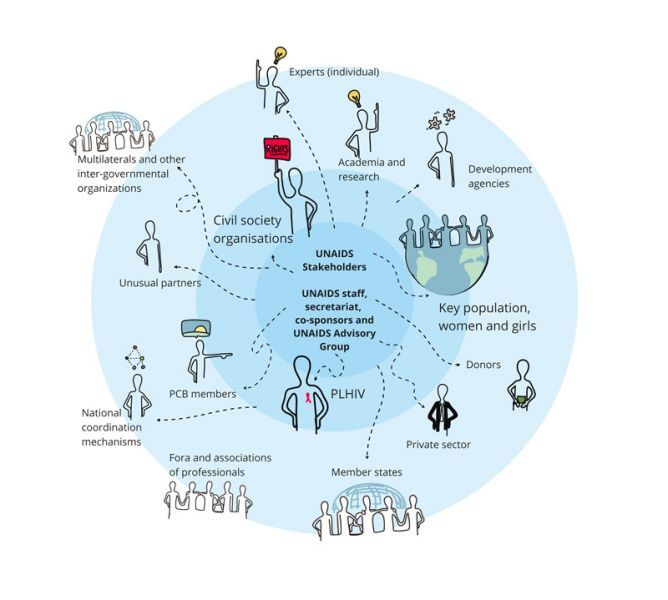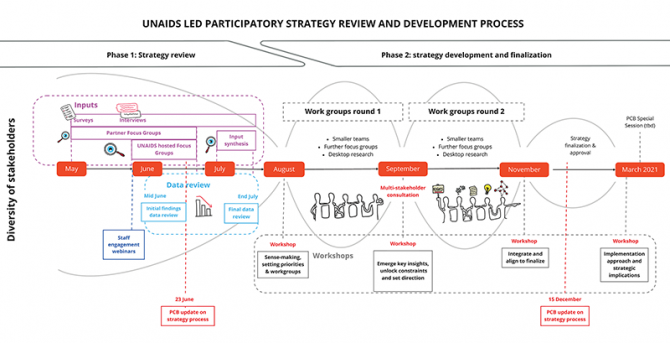
With less than 10 years to go to reach our common goal of ending AIDS by 2030, UNAIDS has been tasked by the Programme Coordinating Board (PCB) to develop the next global AIDS strategy. The strategy will build on the significant gains already made and will accelerate the pace of action—it will be ambitious, visionary and evidence-informed.
The new global AIDS strategy will serve as a road map for the world to end AIDS as a public health threat by 2030, guiding key stakeholders to overcome the challenges and to ensure effective country-led AIDS responses. The new strategy, with new global targets for 2025 and resource needs estimates, will shape the next United Nations General Assembly High-Level Meeting on Ending AIDS and its political declaration.
The development of the next strategy will be data-driven and consultative, involving UNAIDS’ staff, the Cosponsors, civil society, people living with and affected by HIV, young people, faith institutions, ministers of health, finance and gender and parliamentarians, scientists, donors and the private sector.
Phase 1, May–August 2020. Review the current strategy, its implementation and the results obtained and present update of progress to the PCB at its 46th meeting, scheduled for June 2020, options, processes and timelines for decision-making.
Virtual consultations, May-August 2020:
- Quantitative surveys reaching stakeholders and participants.
- Targeted qualitative interviews.
- Focus group discussions (topics to be determined).
The virtual multistakeholder consultation for PCB members is now scheduled to take place at the latest in September 2020.
Phase 2, July 2020 to March 2021. Continue to consult, analyse and synthesize all inputs and produce the next strategy presentation of progress to the 47th PCB and a possible PCB special session in March 2021 for strategy adoption.
The below maps the process between the UNAIDS Secretariat and Cosponsors, the UNAIDS Advisory Group and its working groups and the PCB. It is important to note that the strategy review and development will also be informed by other efforts, such as the 2025 target-setting and resource needs estimates, the evaluation of the United Nations system response, the Global Prevention Coalition, the Global AIDS Monitoring process and the Human Rights Reference Group. Other internal Secretariat work around the Management Action Plan and the response to the Joint Inspection Unit report will also be referenced.
We are committed to ensuring that the next strategy produces programmes and responses that work for the people who are currently unreached and left behind. As such, the global strategy review and development process must:
- Be inclusive, participatory, interactive, multisectoral and multilevel in order to fully inspire inputs from everyone, particularly those whose voices are not often heard owing to stigma, marginalization and exclusion.
- Be self-reflective and explore the successes, challenges and failures in the AIDS response and be reflective of the global health, human rights and development context beyond HIV.
- Be innovative in how to explore partnerships and synergies with other health and development responses, while remaining focused on reaching the goal of ending AIDS by 2030 despite a challenging context.
As such, the stakeholder engagement process needs to ensure that:
- We engage all communities meaningfully throughout the process. As much as we can, we commit to engage community members who are part of networks or organizations that represent their constituency, to ensure that we learn from the collective experience of those communities, but, moreover, to ensure the discussions in the strategy development consultations can be transmitted and shared with their peers and can affect action.
- We hear from voices across all levels of the AIDS response, from the global level to the regional, national and local levels, where the communities we aim to reach access services, capturing the depth and breadth of positions and perspectives.
- We recognize the barriers for the populations left behind to engage in political processes, and that their participation is necessary in order to develop an effective global AIDS strategy that upholds and protects human rights.
- We commit to hear from communities that are marginalized and excluded, for example sex workers, lesbian, gay, bisexual, transgender and intersex people, people who use drugs, people on the move, people with disabilities and other fragile communities.
There will be dialogue among diverse stakeholders to review:
- The path from the beginning of the epidemic, celebrating and learning from successes but also recognizing and learning from challenges and failures.
- The current global health, societal and development context, including the COVID-19 pandemic and its impact.
- The strategic directions that the AIDS response can take to reach its goals and be situated in the 2030 Agenda for Sustainable Development.
- The principles, results and areas of action needed to deliver on the strategy’s strategic directions.
In selecting stakeholders for participation in all strategy consultation processes, the following criteria will be used:
- Ensuring geographic balance.
- Reach (global, regional, national and local).
- Diversity of communities, with an effort to reach the communities left behind (e.g. people living with HIV, key populations, women, young people).
- Gender equality.
- Areas of expertise (e.g. health, human rights, development, economics).
- Key partners in the AIDS response and key stakeholders in health and development.
For more information please contact:
Krittayawan (Tina) Boonto, Coordinator Strategy Development at boontok[at]unaids.org


